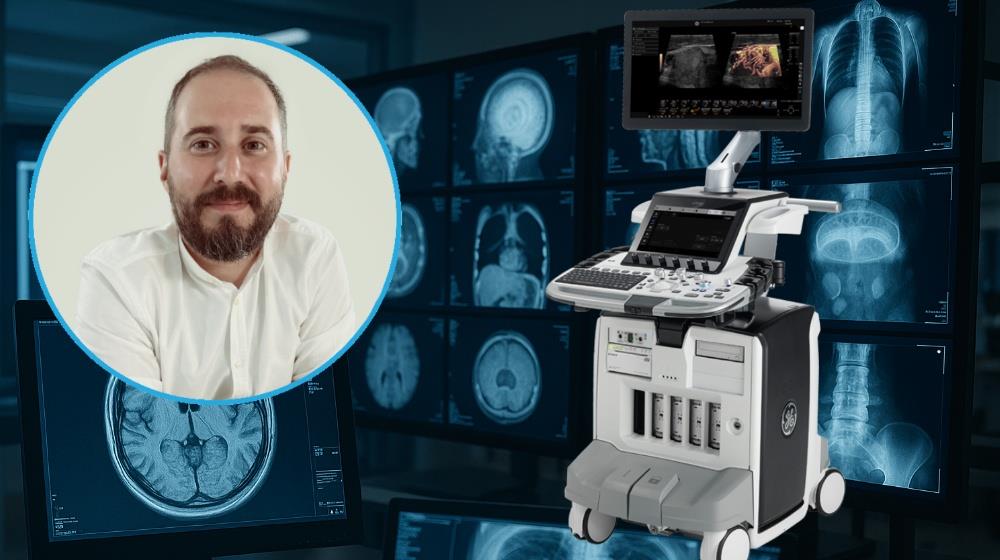Dr Papaderakis is specialised in paediatric imaging, having completed his subspecialty training at Alder Hey Children’s Hospital NHS Trust in Liverpool, United Kingdom.
He has worked for several years in Greece, England, and Belgium, having performed more than 500 examinations on both newborns with underlying conditions and in the context of preventive screenings. He now practises in Cyprus, at Ygia Polyclinic.
What exactly does the neonatal ultrasound screening offered by Ygia include?
The neonatal ultrasound screening performed at Ygia includes three examinations in one visit:
- Brain ultrasound
- Hip ultrasound
- Urinary tract ultrasound (kidneys – ureters – bladder)
It is a quick, reliable, and easily repeatable test, completely free of radiation, which allows the evaluation of anatomy and the detection of any underlying abnormalities. Specifically:
How important is this screening for newborns? What conditions can it help prevent?
Each of the above examinations can be performed either as part of a routine preventive check-up or as a follow-up test in cases of known underlying pathology.
Why choose Ygia?
The main reasons include the following:
- Comprehensive care is provided, ensuring timely and accurate diagnosis, as well as the management of any findings by a specialised team of experts — including neonatologists, paediatricians, and paediatric surgeons.
- The examination is conducted exclusively by a radiologist specialised and certified in paediatric imaging.
- At Ygia, a fully equipped Diagnostic Department operates with state-of-the-art technology. Specifically, the General Electric GE E10 ultrasound system is a cutting-edge imaging device designed to enhance diagnostic capabilities across various clinical settings, offering superior lesion detection performance.
What is exactly included in neonatal check up offered by Ygia?
Neonatal ultrasound check-up performed at Ygia Polyclinic includes three scans in one visit: US brain, US hips and US KUB (kidneys – ureters – bladder). It is a fast, reliable, radiation-free and easily repeatable way to evaluate these body parts’ anatomy and detect any underlying abnormalities.
How crucial is this check-up in terms of prevention?
Each of the aforementioned scans can be performed either as part of a routine check-up or as a follow-up examination of a pre-existing pathology.
US BRAIN
Typical indications of a neonate’s cranial ultrasound are mostly associated with unwell babies or follow-up of known pathology (i.e. hypoxic events, prematurity, trauma, suspected intracranial mass or infection, neurological abnormalities etc.). However on a routine basis the scan can provide high quality images used to evaluate brain anatomy, maturation and possible normal developmental variants.
US HIPS
Main indication for this scan is detection of developmental dysplasia of the hip in order to treat the congenital dislocation early and avoid surgical intervention. Ultrasound examination of the neonatal hips is considered first line of investigation in cases of breech presentation, intrauterine deformities, family history or clinical suspicion of DDH (instability, limitation of abduction, deep uneven gluteal crease, leg length discrepancy etc.). The scan is part of routine screening in many EU countries and plays a vital role in limiting the effect of DDH in paediatric population. It is usually performed between the 4th and 6th week of life (or earlier if there is a family history or risk factors, such as breech presentation).
US KUB
A neonatal renal and urinary tract scan is most commonly used as a follow-up examination of antenatal abnormalities (i.e. hydronephrosis). It is also performed as part of the diagnostic algorithm of urinary tract infections or other clinical and laboratory abnormalities, as well as to exclude syndromic or congenital associations. It is usually performed during the 1st month of life.
Is the process painful for the infant and does it require any preparation beforehand?
The scans are completely painless, safely and easily performed even while the baby is asleep. There is no need for specific preparation, fasting or other restrictions similar to those often required before an adult ultrasound.
Contact us at 25 884650 to schedule your baby’s neonatal ultrasound appointment, ensuring timely and accurate diagnosis for your infant’s healthy development.









